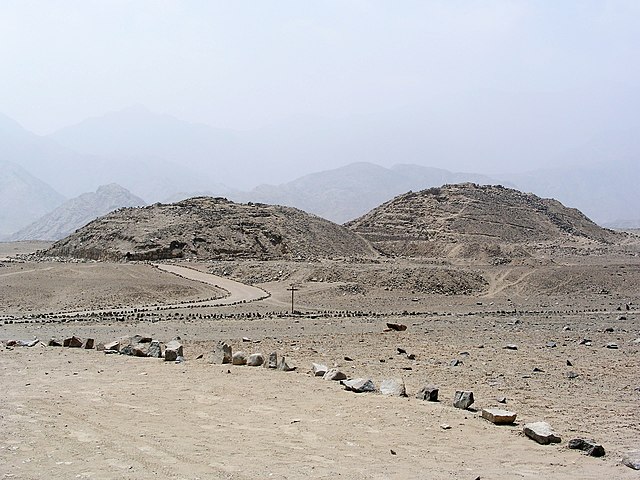When it comes to the pre-Columbian past of Peru, most of us automatically and understandably think of the Incas. But there were many other cultures and civilizations in these lands, some of them much older than the Incas. Several of these elder civilizations originate in what is now desert regions up and down the country's coast north and south of its present-day capital, Lima. One example you've heard about is the Nazca people, because of their now famous artifacts, the Nazca Lines. But you probably haven't heard of is the Western Hemisphere's oldest known city and civilization.
A remarkable complex called Caral, located In the Supe Valley, just 120 miles (200 kilometers) north of Lima, and 19 miles (30 km) inland, is the greatest of 20 remnants of the oldest known civilization in the Americas, a 150-acre (607-hectare) UNESCO World Heritage Site consisting of temple mounds, sunken plazas and the remnants of spectacular stone structures on an arid plateau. First uncovered in 1948, its true importance wasn't discovered by Peruvian archaeologist Ruth Shady, unitl 1994. Subsequently it was carbon-dated back to 5,000 years ago - around the time of ancient Egypt, and far earlier than any previous known civilization in the Americas (up till then, the Olmecs of Mesoamerica).
Given its great age, the site is of course more worn-looking than, say, Machu Picchu, which dates back to just the 15th century AD. But still, there are some impressive structures left. The centerpiece is its main stepped pyramid, Peru's largest, 60 feet tall and covering an area nearly the size of four football fields. There are five others, along with two sunken plazas, and a pair residential districts (one more elaborate for higher-status residents, one more likely for commoners). There's a visitors center with explanatory exhibits, as well.
 Håkan Svensson Xauxa
Håkan Svensson Xauxa
Caral can be visited in a day trip from Lima (you can hire a car yourself or take an excursion from tour operators such as Caral Tours), but in order to get the most out of the site, I recommend an overnight. As far as nearby towns that might be candidates for doing so, Huacho, Barranca, and Végueta (also the site of a museum with artifacts from the Caral civilization) are among the nearest options. But the most convenient option of all is a standalone resort that opened in December 2012 right near the site. The Empedrada Fundo Hotel & Spa is a lovely 22-room property on 360 acres of avocado and mandarin trees, with a restaurant, pool, spa, and various other services, at affordable rates (which of course vary, depending on time of year, but generally run less than 200 USD a night for a double).
More information: ZonaCaral.gob.pe (in Spanish), Go2Peru.com
i
Comments
Thanks, Jacquie! Wow, I knew they were under the radar but the fact that even you have never heard of them proves just how under the radar they indeed are. Yes, they have revolutionized archaeology already and I suspect they still have much more left to tell us!